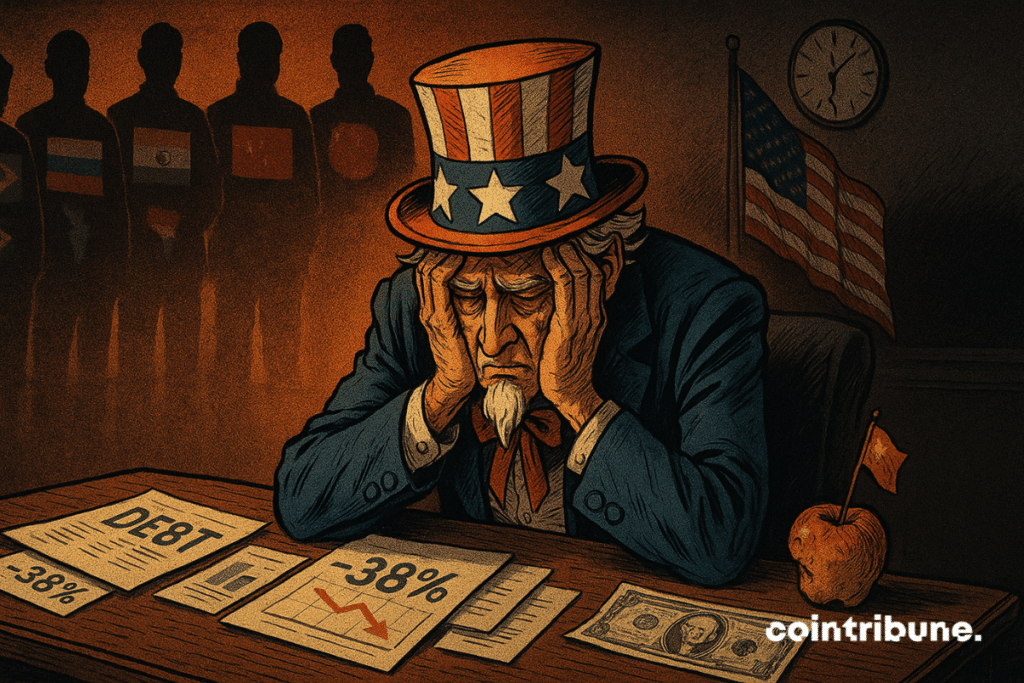Kopeikin Warns Of Fading US Competitiveness
As economic tensions intensify between major powers, a dissenting voice challenges the dominant narrative in Washington. According to Boris Kopeikin, chief economist at the Stolypin Institute, the United States’ trade deficit with China is not the result of a BRICS strategy but a structural weakening of the American economy. This interpretation reignites the debate on the root causes of American imbalances in a world undergoing major reconfiguration.

In brief
- The trade deficit between the United States and China fuels sharp economic tensions amid global geopolitical reshuffling.
- Economist Boris Kopeikin states that this imbalance primarily results from a loss of competitiveness in American economic sectors.
- Contrary to accusations from some American officials, the BRICS are not the direct cause of the deficit according to Kopeikin.
- Kopeikin reminds that the United States depends on the BRICS as much as the reverse, making any decoupling strategy unrealistic.
The American deficit : a loss of competitiveness, not a BRICS conspiracy
Interviewed by the Tass agency on September 9, Boris Kopeikin, chief economist at the Stolypin Institute for Economic Growth, gave a clear diagnosis on the causes of the American trade deficit with China, at a time when Trump had issued a stark warning against the BRICS.
Contrary to the alarmist rhetoric echoed in Washington, Kopeikin believes this imbalance is a symptom of internal weaknesses, not an organized front by the BRICS bloc countries. He declares :
The large trade deficit of the United States with China and a number of other countries, as well as the growth of the national debt, are consequences of the decline in competitiveness of several sectors of the American economy, not the policies of other countries.
This statement contrasts with that of Peter Navarro, former economic advisor to Donald Trump, who stated on Real America’s Voice : “Their exports are like vampires sucking our blood with their unfair trade practices.”
He also described the BRICS bloc as an unstable group, going so far as to say they “historically hate each other and kill each other”, and predicted their collapse without trade with the United States.
Here is what should be retained from this first sequence of analyses :
- The deficit is not attributed to unfair foreign practices according to Kopeikin, but to an erosion of the competitiveness of the American economy ;
- He points to a structural failure of several strategic American sectors, worsened by the rising national debt ;
- This interpretation challenges the dominant rhetoric in the United States, which frequently targets China or the BRICS as responsible for trade imbalances ;
- Kopeikin’s critique is economic and structural, not geopolitical. It calls for a productivity increase, rather than a trade war.
This change of angle refocuses the debate on the internal flaws of the world’s leading power, not on a confrontation between blocs. It calls for a reevaluation of the protectionist discourse, dominant in certain American power circles.
An economic interdependence : an illusory decoupling between blocs
Following up on his analysis, Boris Kopeikin emphasizes that the United States remains deeply linked to the economies of the BRICS, and vice versa.
“The United States heavily depends on imports from China, India, and Brazil, just as these countries consider American demand essential,” he specified.
To support his point, the economist cites the premature end of the trade war between Washington and Beijing as concrete evidence of this structural interdependence. This finding casts a shadow on the economic decoupling ambitions promoted by some American political leaders, who rely on internal reindustrialization to reduce strategic dependence.
This position finds a particular echo in statements made the previous day by Chinese President Xi Jinping during a virtual BRICS summit. The leader condemned “unilateral tariffs and trade conflicts initiated by certain countries” which he considers destabilizing elements to the world economy.
The summit, focused on international economic governance challenges, reaffirmed the bloc’s commitment to promoting multilateralism, economic cooperation, and the defense of international trade rules. Some critics in Washington continue accusing the BRICS of exploiting access to the American market without recognizing the mutual benefits generated by these exchanges.
The implications of these statements are multiple. On one hand, they question the viability of an American economic strategy based on reducing exchanges with emerging powers. On the other hand, they reveal the systemic risks that voluntary economic isolation of the United States through Trump’s tariffs would represent, notably on their supply chains and long-term growth.
Maximize your Cointribune experience with our "Read to Earn" program! For every article you read, earn points and access exclusive rewards. Sign up now and start earning benefits.
Diplômé de Sciences Po Toulouse et titulaire d'une certification consultant blockchain délivrée par Alyra, j'ai rejoint l'aventure Cointribune en 2019. Convaincu du potentiel de la blockchain pour transformer de nombreux secteurs de l'économie, j'ai pris l'engagement de sensibiliser et d'informer le grand public sur cet écosystème en constante évolution. Mon objectif est de permettre à chacun de mieux comprendre la blockchain et de saisir les opportunités qu'elle offre. Je m'efforce chaque jour de fournir une analyse objective de l'actualité, de décrypter les tendances du marché, de relayer les dernières innovations technologiques et de mettre en perspective les enjeux économiques et sociétaux de cette révolution en marche.
The views, thoughts, and opinions expressed in this article belong solely to the author, and should not be taken as investment advice. Do your own research before taking any investment decisions.